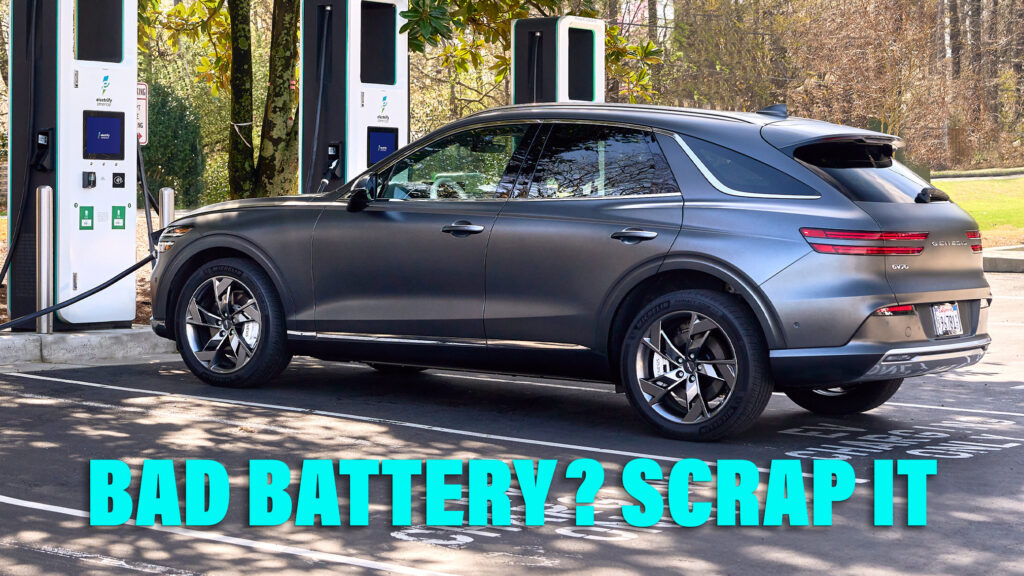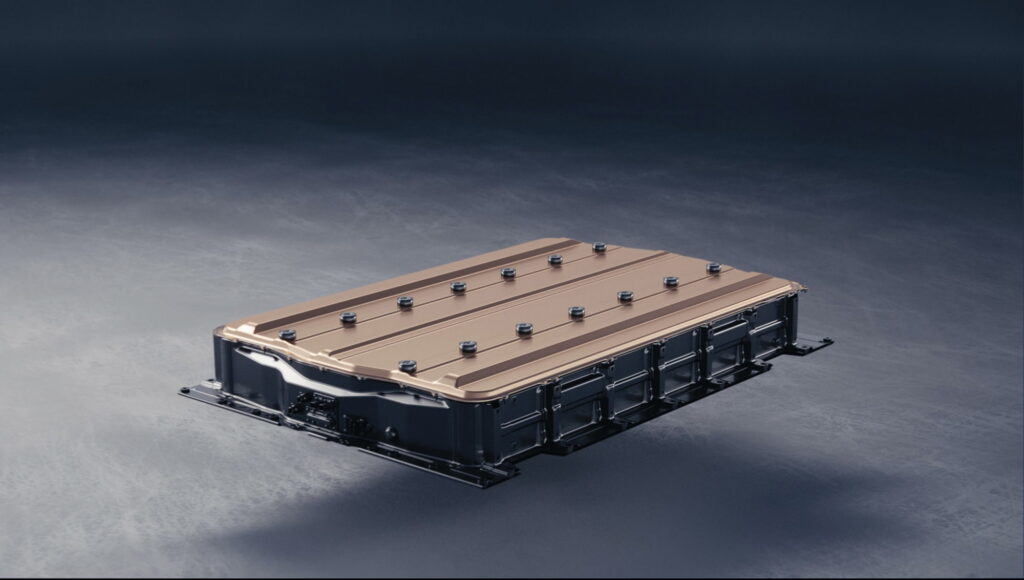Batteries cost a lot to replace, raising insurance premiums and damaging the environment
by Sebastien Bell

Proprietary battery systems and the novelty of the technology mean that repairing even minor faults in electric vehicles can be extremely difficult, not to mention costly too. That leads numerous insurance companies to simply scrap EVs with only minor faults, which is problematic not only for insurers, but owners and the environment as well.
This even affects vehicles involved in minor accidents whose battery packs have only a small amount of damage. Insurers and mechanics complain that there’s no simple way to check on the status of the batteries, meaning it has to be thrown out completely lest the companies face liability in the event of future faults, reports Reuters.
As a result, insurers are opting to simply total the vehicles. That pushes up the price of insuring EVs, which can cost as much as 27 percent more than vehicles with combustion engines, according to some sources.
Read: Car Owners In Canada Shockingly Quoted As Much As $23,000 For Hybrid And EV Battery Replacements

Now, insurers call on automakers to make it easier to access data and repair battery packs. Some have responded, with GM, Ford, and Nissan all claiming that they have developed ways to make repairs possible. GM in particular noted that their latest Ultium batteries were engineered to be repaired at the module level making them “significantly less expensive than replacing the entire battery pack” adding that they allow third-party access to battery data.
Not all automakers are quite as committed, however. Tesla, America’s biggest EV manufacturer, is investing in a new battery technology with larger cells that are glued into the pack. According to automotive expert and repair advisor Sandy Munro, the new pack has “zero repairability” adding that, “a Tesla structural battery pack is going straight to the grinder.”
That not only poses a problem for owners and insurers, but for the environment, too. In addition to being the most expensive part of a vehicle, the battery is also the most carbon intensive.
“The number of cases is going to increase, so the handling of batteries is a crucial point,” Christoph Lauterwasser, managing director of the Allianz Center for Technology, told Reuters. “If you throw away the vehicle at an early stage, you’ve lost pretty much all advantage in terms of CO2 emissions,” he said.
In order for EVs to be more ecological than combustion vehicles, they have to be on the road for a number of miles so that their zero emissions make up for their larger manufacturing carbon footprint. But with more and more unused battery packs finding their ways into junkyards, the advantages of those EVs are not realized.
Car insurance firms want EV battery pack data, threatening higher premiums
By William Johnson
Posted on March 20, 2023
Posted on March 20, 2023
TESLARATI
Car insurance companies are threatening automakers with increasing premiums if they don’t open their EV battery data to third parties.
By far, the most expensive part of any electric vehicle is its battery; hence, when an EV gets into an accident, it is the firm thing that is checked for damage. However, with many brands keeping battery information locked away, insurers claim they are being forced to prematurely total vehicles simply because they cannot accurately assess the damage. To get automakers to open their data and make their batteries more repairable, insurers are now threatening to continue to increase premiums.
As initially reported by Reuters, the push from insurers follows a dramatic increase in the number of EVs on the road and hence, a dramatic increase in the number of EVs involved in accidents. But what happens after an accident has become highly dependent on a driver’s insurer and the brand of EV they drive.
Sadly, in the case of most Tesla drivers, the battery or entire car must be replaced following a crash. If any internal battery components are damaged, they can be dangerous if driven again. This is only compounded by Tesla’s infamous lack of repairability.
According to a series of Tesla stores contacted by Teslarati, the most common outcome if a battery is damaged is to replace the entire car, as often the damage to the battery, combined with the damage to the body and electronics, totals the vehicle. However, it should be noted that Tesla offers battery replacement as part of their service for those willing to pay.
In the case of Ford, Nissan, or GM vehicles, owners are in a slightly better situation. According to comments given to Reuters, these automakers have designed some, if not most, parts of the battery pack to be replaceable in the case of an accident. Ford states that outside casing materials have been designed for replacement, while GM explained that specific battery cells could be identified by GM dealers for replacement, preventing the need for an entirely new battery pack. Nissan states that battery modules can be replaced in the case of an accident.
Stellantis brands, much like Tesla, will not do battery pack repair and states that any electric vehicle in an accident where the airbags are deployed must have its battery replaced.
None of the automakers have commented on opening their battery data to insurers or third parties, though they may be forced to if customers continue to see their premiums climb.
This reaction from insurers is one of the fundamental reasons Tesla established its own insurance provider. However, as the program remains locked to specific states, only a limited number of Tesla owners can qualify for the service. But if Tesla continues to expand its service to cover more States, other insurers may have no choice but to lower their premiums for Tesla owners to remain competitive.
What do you think of the article? Do you have any comments, questions, or concerns? Shoot me an email at william@teslarati.com. You can also reach me on Twitter @WilliamWritin. If you have news tips, email us at tips@teslarati.com!
Car insurance companies are threatening automakers with increasing premiums if they don’t open their EV battery data to third parties.
By far, the most expensive part of any electric vehicle is its battery; hence, when an EV gets into an accident, it is the firm thing that is checked for damage. However, with many brands keeping battery information locked away, insurers claim they are being forced to prematurely total vehicles simply because they cannot accurately assess the damage. To get automakers to open their data and make their batteries more repairable, insurers are now threatening to continue to increase premiums.
As initially reported by Reuters, the push from insurers follows a dramatic increase in the number of EVs on the road and hence, a dramatic increase in the number of EVs involved in accidents. But what happens after an accident has become highly dependent on a driver’s insurer and the brand of EV they drive.
Sadly, in the case of most Tesla drivers, the battery or entire car must be replaced following a crash. If any internal battery components are damaged, they can be dangerous if driven again. This is only compounded by Tesla’s infamous lack of repairability.
According to a series of Tesla stores contacted by Teslarati, the most common outcome if a battery is damaged is to replace the entire car, as often the damage to the battery, combined with the damage to the body and electronics, totals the vehicle. However, it should be noted that Tesla offers battery replacement as part of their service for those willing to pay.
In the case of Ford, Nissan, or GM vehicles, owners are in a slightly better situation. According to comments given to Reuters, these automakers have designed some, if not most, parts of the battery pack to be replaceable in the case of an accident. Ford states that outside casing materials have been designed for replacement, while GM explained that specific battery cells could be identified by GM dealers for replacement, preventing the need for an entirely new battery pack. Nissan states that battery modules can be replaced in the case of an accident.
Stellantis brands, much like Tesla, will not do battery pack repair and states that any electric vehicle in an accident where the airbags are deployed must have its battery replaced.
None of the automakers have commented on opening their battery data to insurers or third parties, though they may be forced to if customers continue to see their premiums climb.
This reaction from insurers is one of the fundamental reasons Tesla established its own insurance provider. However, as the program remains locked to specific states, only a limited number of Tesla owners can qualify for the service. But if Tesla continues to expand its service to cover more States, other insurers may have no choice but to lower their premiums for Tesla owners to remain competitive.
What do you think of the article? Do you have any comments, questions, or concerns? Shoot me an email at william@teslarati.com. You can also reach me on Twitter @WilliamWritin. If you have news tips, email us at tips@teslarati.com!
No comments:
Post a Comment